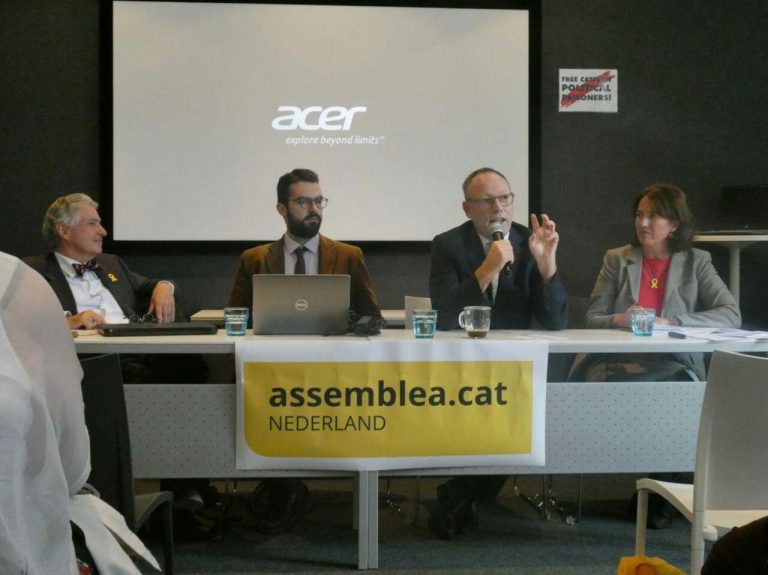
The Catalan National Assembly (ANC) held a symposium on the right to self-determination in The Hague. Prestigious speakers included the former United Nations rapporteur Alfred-Maurice de Zayas, the lawyer and human rights advocate Ben Emmerson, the UNPO representative Fernando Burgés and ANC President Elisenda Paluzie. The event was chaired by Jeff Handmaker, senior lecturer at the Institute of Social Studies.
Alfred de Zayas defined the right to self-determination and described the cases to which it applies. He stressed that many conflicts stem from violent denial of this right, whereas exercising it can be an effective democratic means of reinforcing and spreading respect for human rights, peace and stability. Finally, De Zayas said that international institutions like UNO must show firm commitment to defending the right to self-determination as a tool to build a democratic and equitable order for each and every citizen.
Fernando Burgés explained how the right to self-determination can fit into democratic contexts without triggering political breakup or creating instability. As examples, Burgés recalled how the Swiss Canton of Jura had exercised the right to self-determination unilaterally against the Canton of Berne within the framework of the Swiss Confederation and how Scotland or Catalonia should be able to exercise their right to self-determination within the European Union context as an internal expansion of the Union.
Next, Ben Emmerson reported on how the Spanish State has been systematically violating national and international law to prevent Catalonia from exercising its right to self-determination, culminating in physical violence perpetrated by the State, as on 1 October 2017, coupled with denial of the most basic political rights and cases of exile, political prisoners and reprisals.
Finally, Elisenda Paluzie explained how the Spanish State authorities have been systematically blocking any political approach to open the way to exercising the right to self-determination or to negotiate significant changes to the autonomy system in Catalonia. This blockage provoked by the supreme State authorities has grown into a political conflict leaving the demand for self-determination as the only viable alternative allowing Catalan society to make a significant decision about its political framework.
Paluzie summarized the timeline of events and highlighted the fact that the referendum of 1st October achieved a higher participation than other votes, such as the referendum on the European constitution in Spain, or Brexit in the United Kingdom. She emphasized that the Catalan Parliament has a pro-independence absolute majority, that the Catalan Government is also pro-independence, and that citizens are constantly mobilized for this purpose. These tools, when the right moment arrives, will be used to achieve independence.
Although she did not dismiss the possibility of a negotiation for a referendum on independence, she feels that in reality this is not a likely outcome. Therefore, it is necessary to go ahead and she cited Kosovo as an example, which has a declaration of independence that does not violate international law.
The debate was held at the Buitenhof, in the centre of The Hague, the political capital of the Netherlands and a city of intense diplomatic activity as the headquarters of various international organizations and courts, non-governmental organizations and academic institutions.